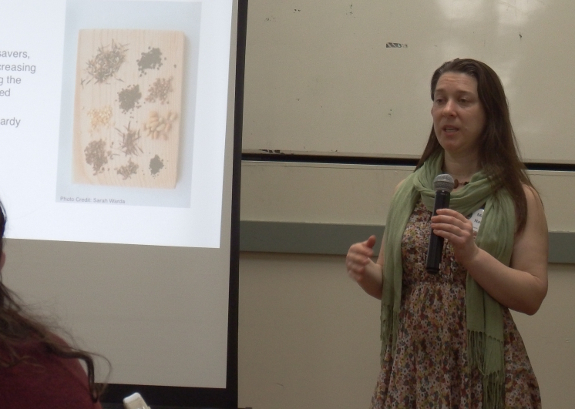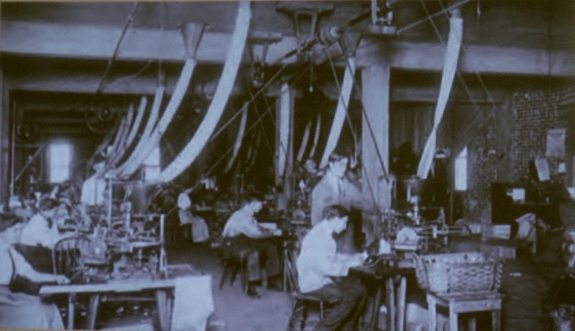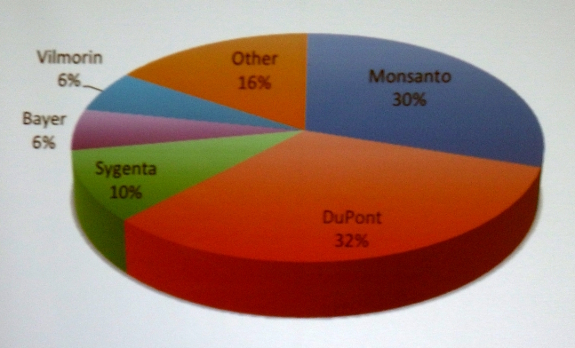
The history of seed legislation

Nowadays, the politics
of seeds mostly has to do with GMO and patented varieties. But the
modern pendulum swing is just the latest in a long line of American
haggling over propagules, as Mary Nally explained in the Community Food
Initiative's Seed to Sustainability Workshop this past weekend.

In fact, in the mid
1800s, the US Patent Office devoted 30% of their budget to giving away
free seeds. Over a million packets were distributed to American
gardeners before the nation's budding seed companies stepped in.
"How are we supposed to
make a buck if the government is undercutting us at every turn?" seed
companies complained. By the end of the century, free seeds were
(mostly) a thing of the past.

Fast forward ahead to
the early twenty-first century, when three companies controlled 72% of
world seed sales. Various types of patents now prevent you from selling
patented varieties or (in the case of utility patents based on patented
DNA) even saving seeds for your own use. In fact, the Community Food
Initiatives staff were surprised to learn that seed swapping --- that
staple of backyard gardeners in which no money changes hands --- is
technically against Ohio law in many instances.
So what's a gardener to
do? Mary Nally's advice is to work on changing that law. The Recomended
Uniform State Seed Law (RUSSL for short) is a third-party ethical model
that allows seed swaps, seed libraries, and seed banks while still
protecting the economic system that makes the production of new
varieties viable. Several states have already replaced outdated
legislation with RUSSL-based standards. Perhaps Ohio will be next?
Want more in-depth information? Browse through our books.
Or explore more posts by date or by subject.
About us: Anna Hess and Mark Hamilton spent over a decade living self-sufficiently in the mountains of Virginia before moving north to start over from scratch in the foothills of Ohio. They've experimented with permaculture, no-till gardening, trailersteading, home-based microbusinesses and much more, writing about their adventures in both blogs and books.
Want to be notified when new comments are posted on this page? Click on the RSS button after you add a comment to subscribe to the comment feed, or simply check the box beside "email replies to me" while writing your comment.

Hi Anna and Mark,
I seems like something simple and important has been forgotten?
John
"seed swapping --- that staple of backyard gardeners in which no money changes hands "
I've read about a lot of incredibly stupid laws, but this one takes the cake! How are the "authorities" going to track down and prosecute people who swap seeds (even at "seed swapping events")? Seed swapping is at the bottom of "criminal" behavior and the police have more important things to do than check out neighborhood "plant swaps". Besides, many "seed swappers" actually advance genetic diversity by hybridization.
What really irritates me is that this a law that is specifically designed to help a specific industry. It does absolutely no good for anyone, and may, in fact, actually prevent diversity in the biosphere by preventing seed swappers from developing new, more resistant varieties.
The stupidity of greed never ceases to amaze me.
In cases like this where a law is clearly written for the sole benefit of some companies and to the detriment of all citizens, I would not consider it morally wrong to ignore that law.
It also seems strange to me that you can patent seeds. Especially on the basis of DNA. IIRC, the US supreme court ruled in 2013 that human genes cannot be patented because they are something that occurs in nature and is not invented. Logically, that reasoning is equally valid for non-human DNA.
But in a wider context, how can you say that a seed is an "invention" worthy of patent protection? People have been breeding plants and animals for thousands of years. If someone were to find an improvent to that process, that might be worthy of patent protection. But not the products of that process.